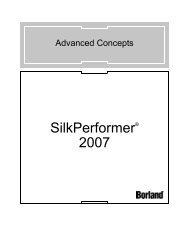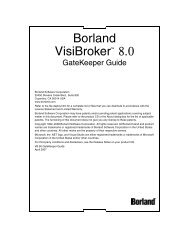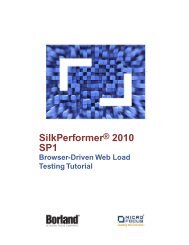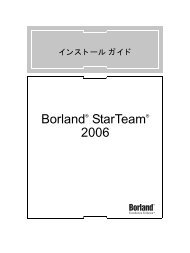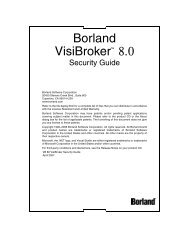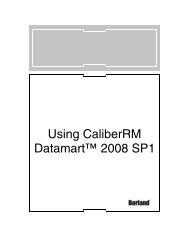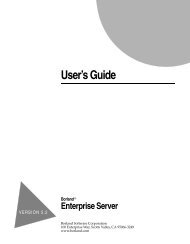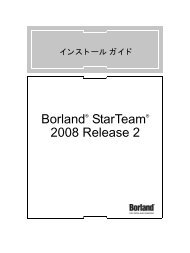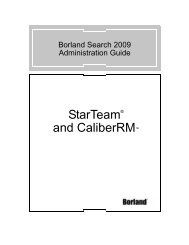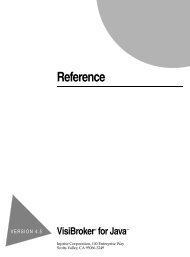SilkPerformer Citrix Tutorial - Borland Technical Publications
SilkPerformer Citrix Tutorial - Borland Technical Publications
SilkPerformer Citrix Tutorial - Borland Technical Publications
You also want an ePaper? Increase the reach of your titles
YUMPU automatically turns print PDFs into web optimized ePapers that Google loves.
6 BEST PRACTICES<br />
Troubleshooting Scripts<br />
Clearing terminal<br />
server sessions<br />
Handling application<br />
errors<br />
Avoiding think times<br />
Re-recording portions<br />
of a script<br />
After a failed test execution, ensure that you reset all terminal server sessions<br />
before you execute the load test again, otherwise your script will likely fail.<br />
During load tests, your application is likely to throw errors due to generated<br />
load. Adding event handlers to your script that can handle and report such errors<br />
is very helpful.<br />
Here is an example of an event handler that continuously watches for a window<br />
with the name Program Error Intercepted and executes an ALT-C to close any<br />
such window that appears. The event handler also generates an error message<br />
whenever such an error occurs.<br />
dclevent<br />
handler Handler1 <br />
var<br />
nInterrupt, nWindow : number;<br />
nStyle<br />
: number;<br />
sWindowCaption : string;<br />
begin<br />
<strong>Citrix</strong>GetActInterrupt(nInterrupt, nWindow);<br />
ErrorAdd(FACILITY_CITRIXENGINE, 47, SEVERITY_<br />
INFORMATIONAL);<br />
print(string(nWindow));<br />
<strong>Citrix</strong>GetWindowCaption(nWindow, sWindowCaption);<br />
if sWindowCaption = "Program Error Intercepted" then<br />
<strong>Citrix</strong>Key(67, MOD_Alt); // 'c'<br />
end;<br />
ErrorRemove(FACILITY_CITRIXENGINE, 47);<br />
end Handler1;<br />
While it may be tempting to use Wait() or ThinkTime statements to avoid having<br />
scripts overrun applications under test, this practice is not recommended for two<br />
reasons:<br />
• When load generation increases, application processing speed may slow<br />
considerably. The wait statement may eventually be too short and the<br />
problem of overrunning the application will again present itself.<br />
• If you are measuring the response times of window, text, or screen<br />
synchronizations, the time in the Wait() statement will artificially bloat<br />
response times.<br />
The solution is to use synchronizations. See “Synchronization Options” for<br />
more information.<br />
Sometimes changes in application behavior result in portions of a recorded<br />
script becoming obsolete. Re-recording a portion of a use case is an option, but<br />
beware that the recorder may not be able to track the handles of the existing<br />
windows, resulting in incorrect window handle numbers. These issues can make<br />
the process of integrating newly recorded script with an original script quite<br />
tedious. When a use case is small, it is recommended that you re-record the<br />
<strong>SilkPerformer</strong> <strong>Citrix</strong> <strong>Tutorial</strong> 71



